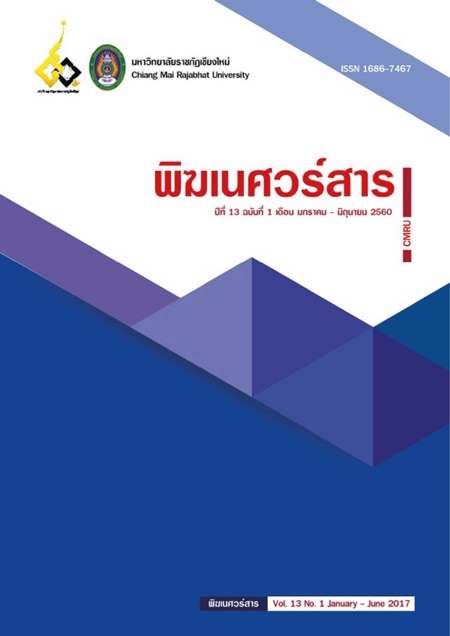การพัฒนาความร่วมมือการจัดการอาชีวศึกษาระบบทวิภาคีของวิทยาลัยการอาชีพในภาคเหนือตอนบน
Main Article Content
บทคัดย่อ
งานวิจัยนี้ มีวัตถุประสงค์เพื่อศึกษาสภาพความร่วมมือการจัดการอาชีวศึกษาระบบทวิภาคีและปัจจัยที่มีผลต่อความร่วมมือในการจัดการอาชีวศึกษาระบบทวิภาคี รวมถึงแนวทางการพัฒนาความร่วมมือในการจัดการอาชีวศึกษาระบบทวิภาคี ของวิทยาลัยการอาชีพ ในภาคเหนือตอนบน โดยวิธีวิจัยเชิงปริมาณ ใช้แบบสำรวจความคิดเห็นจากกลุ่มตัวอย่าง จำนวน 360 คน นำข้อมูลมาวิเคราะห์โดยใช้สถิติเชิงพรรณนา การวิเคราะห์สมการถดถอยพหุคุณแบบธรรมดา และทดสอบสมมติฐานด้วยการคำนวณหาค่า P-value ผลการวิจัยสภาพความร่วมมือการจัดการอาชีวศึกษาระบบทวิภาคีของวิทยาลัยการอาชีพ ในภาคเหนือตอนบน ตามองค์ประกอบ 5 ด้าน คือ การติดตามและประเมินผล การตัดสินใจพัฒนาและแก้ปัญหา การทำงานร่วมกัน การค้นหาปัญหาและการวางแผนการพัฒนามีความสำคัญอยู่ในระดับมาก ปัจจัยที่มีผลต่อความร่วมมือในการจัดการอาชีวศึกษาระบบทวิภาคี ตามองค์ประกอบ 4 ด้าน พบว่า ปัจจัยที่พยากรณ์ความร่วมมือในการจัดการอาชีวศึกษาระบบทวิภาคี ของวิทยาลัยการอาชีพ ในภาคเหนือตอนบน เป็นอันดับแรกคือ ด้านบุคลากร รองลงมาคือ การจัดการเรียนการสอน การบริหารและหลักสูตร ส่วนแนวทางการพัฒนาความร่วมมือในการจัดการอาชีวศึกษาระบบทวิภาคี ของวิทยาลัยการอาชีพ ประกอบด้วยการค้นหาปัญหา การวางแผนการพัฒนา การตัดสินใจพัฒนาและแก้ปัญหา การทำงานร่วมกัน และการติดตามและประเมินผล
COLLABORATION DEVELOPMENT OF DUAL VOCATIONAL EDUCATION MANAGEMENT OF INDUSTRIAL AND COMMUNITY EDUCATION COLLEGES IN UPPER NORTHERN REGION
The objectives of this research were to investigate the collaboration circumstance of bilateral cooperative education management, to examine the guidelines affecting the collaboration circumstance of bilateral cooperative education management, and to develop the collaboration guidelines for bilateral cooperative education management of Industrial and Community Education Colleges in Upper Northern Region. The quantitative were employed questionnaire to examine the opinion from 360 samples. The results showed that the respondents expressed their opinion at the high level toward the collaboration circumstance of bilateral cooperative education management in regard to monitoring and evaluation, decision making and problem solving, cooperative, root cause analysis and development planning. The factors affecting the collaboration of bilateral cooperative education management were personnel factor instructional management, administration, and curriculum factors respectively. The collaboration development guidelines consisted of root cause analyzing, development planning, decision making and problem solving, cooperating, and monitoring and evaluating.
Downloads
Article Details
บทความที่ได้รับการตีพิมพ์เป็นลิขสิทธิ์ของบัณฑิตวิทยาลัย มหาวิทยาลัยราชภัฎเชียงใหม่
ข้อความที่ปรากฏในบทความแต่ละเรื่องในวารสารวิชาการเล่มนี้เป็นความคิดเห็นส่วนตัวของผู้เขียนแต่ละท่านไม่เกี่ยวข้องกับมหาวิทยาลัยราชภัฎเชียงใหม่ และคณาจารย์ท่านอื่นๆ ในมหาวิทยาลัยฯ แต่อย่างใด ความรับผิดชอบองค์ประกอบทั้งหมดของบทความแต่ละเรื่องเป็นของผู้เขียนแต่ละท่าน หากมีความผิดพลาดใด ๆ ผู้เขียนแต่ละท่านจะรับผิดชอบบทความของตนเองแต่ผู้เดียว


